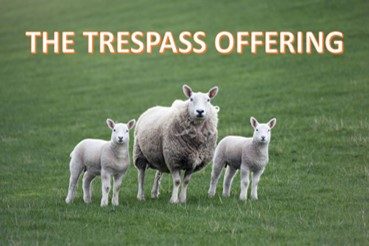
Introduction
Read Leviticus 5:1-17 / Leviticus 7:1-10.
The Trespass Offering was for specific known sins, trespasses where the person knew what they had done, because of their conscience, in relation to their experience versus what they knew God required.
As indicated previously, the Trespass Offering and the Sin Offering have some degree of overlap, where ‘Sin’ might be considered to be our sinful nature and ‘Trespass’ as a sinful deed, a wrongdoing, a trespass.
This is illustrated by the following passage from John’s first letter. Note first the sinful nature is mentioned, then the specific sinful deeds, and sins. 1 John 1:7-2:2. The word, ‘propitiation’ or ‘atoning sacrifice’ means an ‘anger-quenching, penalty-paying offering to God’.
This then is the good news of the Trespass Offering, ‘Christ died for our sins’. 1 Corinthians 15:3. See also Hebrews 9:28 / 1 Peter 2:24 / 1 Peter 3:18.
The difference between sin and trespass
‘You were made alive when you were dead in trespasses and sins.’ Ephesians 2:1
Notice that we were dead in two things, trespasses and sins. There is a difference between the two. Trespasses have to do with specific acts of sin, while sin, not sins, but sin, has to do with a state of being. In other words, trespasses are always about what a person does, while sin is about what a person is.
Let me make one point of clarification though. There are actions that can be done that are called sins, but I am referring to sin itself, as a principle.
Under the law covenant, there was the sacrifice for sin and the sacrifice for trespasses. While they seemed to be the same, they weren’t. Sins and trespasses are basically the same, but sin isn’t the same as either of them.
Sin is the root law or principle, or state of existence, behind those acts that are called sins or trespasses.
